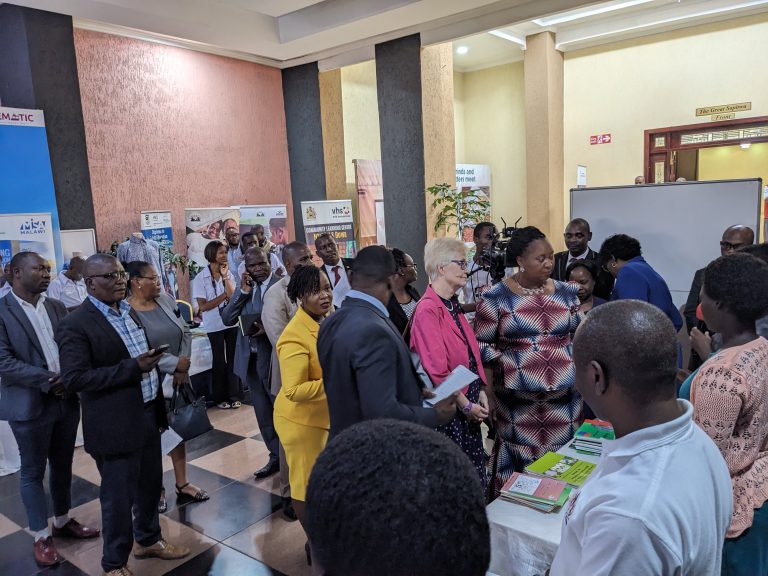Malawi launches ALE Strategy with a call for an Integrated approach to Adult Learning and Education
7 December 2023 | Dyson Mthawanji | DVV International Malawi Policy and legislation

On Thursday 30th November 2023, Ministry of Gender, Community Development and Social Welfare in Malawi launched the National Adult Literacy and Education Strategic Plan (2022-2027). The goal of this strategy, which was launched in Lilongwe, is to increase literacy, and to enhance skills development and education through lifelong learning among adults for effective participation in personal, community and national development by 2027. The Government’s also emphasised the need for joint efforts to increase integrated adult education programmes across the country.
The Minister of Gender, Community Development and Social Welfare, Jean Sendeza, who was the guest of honour at the event, stressed that adult education programmes must go beyond literacy and numeracy to incorporate a range of skills that adults need. “Apart from teaching how to read and write, and arithmetic, adult literacy programmes should also provide opportunities for the acquisition of knowledge and skills in areas such as agriculture, business management, family planning, nutrition and home management, hygiene and sanitation, natural resources and environmental management, human rights, leadership and democracy at local levels”, she stated.
The launch of the strategy follows on the heels of another milestone – the National Adult Literacy and Education Policy, which was approved by Malawi Government in 2020.
DVV International, which provided technical and financial support for the development of the Strategy, emphasized the need for stakeholders in the Adult Learning and Education (ALE) sector to work together for the implementation of the Strategy.
Speaking to the media during the launch, DVV International Regional Director for Southern Africa Gerhard Quincke observed that stakeholders’ collaboration is key in implementing the strategy in order to realise meaningful progress for community development. “This strategic plan aims at bringing all stakeholders together and harness their efforts to, among other things, strengthen the policy and legal environment for implementation of Adult Literacy and Education programmes.
“The strategy also aims at increasing inclusive and accessible literacy and enhancing skills development and education among adults for effective participation in personal, community and national development by 2027. Therefore, we call for total collaboration and commitment in the implementation of the Strategy,” said Quincke.
The vision of the Strategy is to see that Malawi has inclusive, equitable and sustainable adult literacy and skills programmes that are accessible to all. This vision marries well with Sustainable Development Goal Number 4, which also emphasises education for all. In order to achieve this vision, the Strategy is guided, among others, by the values of partnership, collaboration and networking.
Sendeza acknowledged that teaching and learning materials are in short supply for ALE in Malawi. She lamented that this challenge continues hampering efforts to reach out to more adults. She stated that the launch of the National Adult Literacy and Education Strategy signals a significant commitment by the Government to advancing education and knowledge among youths and adults. “The strategy provides lifelong learning and a direction to informal skills development for literates and neo-literates in such areas as salons, manicure, pedicure, barbering, tyre fitting, motorbike maintenance, tailoring, phone repairing, and computer repairing, among others, to ensure self-reliance socially and economically.
“My Ministry is convinced that facilitating mind-set change and promoting self-reliance among community members ensures attainment of sustainable development at individual, community, and national levels. I, therefore, urge all stakeholders to identify areas in the strategy which they will support, and report on progress annually until 2027. This will help us monitor the attainment of strategic objectives. It will also help us to take timely action where we are off-track or lagging behind,” said Sendeza.
She shared that the last time teaching and learning materials were procured for ALE using government resources was in 2012, at which time every literacy centre received a consignment of learning materials. Very little of these are still available today.
At the start of the event, the Minister, accompanied by the German Ambassador to Malawi, Mrs. Ute König, Civil Society Education Coalition (CSEC) Executive Director Mr. Benedicto Kondowe, DVV International Malawi Board Chairperson Mrs. Ruth Mwandira, and other dignitaries, visited various pavilions which showcased ALE materials. Among the items displayed were locally made shirts made by tailors trained at local Community Learning Centres (CLCs). The CLCs were set up by the Ministry of Gender in partnership with DVV International and local communities. These centres are designed to provide a supportive and inclusive environment for adults to engage in learning activities, acquire new skills, and enhance their knowledge.
The German Ambassador urged the Malawi Government to channel resources (personnel, infrastructure, and finance) to communities to make ALE operational to communities, and to support adult educators without whom ALE cannot succeed. “Germany through its Federal Ministry of Economic Cooperation and Development (BMZ), which works here in this context through DVV International is ready to support this noble effort,” she stated.
Speaking on behalf of Civil Society, M. Benedicto Kondowe highlighted the importance of adult education in both community and national development. “Let us heed the call for unity, recognizing that the synergy between government and CSOs is the cornerstone of a truly inclusive education system,” he said.
Malawi Government statistics show that the illiteracy rate in rural areas is 35.2% among women is 35.2% percent and 19.4% among men. While in urban areas, 5.6% of men are illiterate compared to 10% of women.